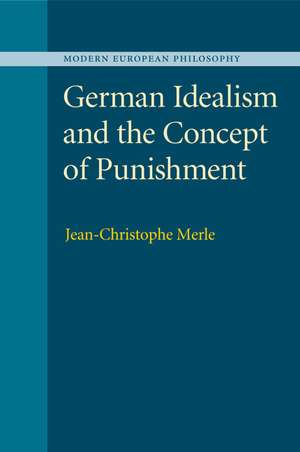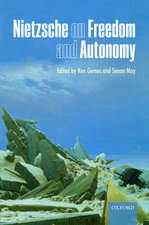German Idealism and the Concept of Punishment: Modern European Philosophy
Autor Jean-Christophe Merleen Limba Engleză Paperback – 16 dec 2015
| Toate formatele și edițiile | Preț | Express |
|---|---|---|
| Paperback (1) | 281.49 lei 6-8 săpt. | |
| Cambridge University Press – 16 dec 2015 | 281.49 lei 6-8 săpt. | |
| Hardback (1) | 390.14 lei 6-8 săpt. | |
| Cambridge University Press – 27 mai 2009 | 390.14 lei 6-8 săpt. |
Din seria Modern European Philosophy
-
 Preț: 102.23 lei
Preț: 102.23 lei -
 Preț: 193.16 lei
Preț: 193.16 lei -
 Preț: 192.64 lei
Preț: 192.64 lei -
 Preț: 195.52 lei
Preț: 195.52 lei -
 Preț: 296.68 lei
Preț: 296.68 lei -
 Preț: 233.56 lei
Preț: 233.56 lei -
 Preț: 273.11 lei
Preț: 273.11 lei -
 Preț: 279.86 lei
Preț: 279.86 lei -
 Preț: 370.56 lei
Preț: 370.56 lei -
 Preț: 333.43 lei
Preț: 333.43 lei -
 Preț: 441.96 lei
Preț: 441.96 lei -
 Preț: 289.39 lei
Preț: 289.39 lei -
 Preț: 312.27 lei
Preț: 312.27 lei -
 Preț: 409.33 lei
Preț: 409.33 lei - 14%
 Preț: 764.18 lei
Preț: 764.18 lei -
 Preț: 275.63 lei
Preț: 275.63 lei -
 Preț: 214.21 lei
Preț: 214.21 lei - 11%
 Preț: 548.33 lei
Preț: 548.33 lei -
 Preț: 327.20 lei
Preț: 327.20 lei -
 Preț: 406.83 lei
Preț: 406.83 lei -
 Preț: 423.35 lei
Preț: 423.35 lei - 14%
 Preț: 873.19 lei
Preț: 873.19 lei -
 Preț: 286.63 lei
Preț: 286.63 lei -
 Preț: 362.87 lei
Preț: 362.87 lei - 11%
 Preț: 487.63 lei
Preț: 487.63 lei -
 Preț: 344.99 lei
Preț: 344.99 lei - 11%
 Preț: 552.94 lei
Preț: 552.94 lei - 11%
 Preț: 643.05 lei
Preț: 643.05 lei -
 Preț: 458.83 lei
Preț: 458.83 lei -
 Preț: 445.71 lei
Preț: 445.71 lei -
 Preț: 310.75 lei
Preț: 310.75 lei -
 Preț: 445.34 lei
Preț: 445.34 lei - 11%
 Preț: 459.31 lei
Preț: 459.31 lei - 11%
 Preț: 647.01 lei
Preț: 647.01 lei -
 Preț: 365.22 lei
Preț: 365.22 lei -
 Preț: 243.55 lei
Preț: 243.55 lei - 11%
 Preț: 552.94 lei
Preț: 552.94 lei -
 Preț: 429.91 lei
Preț: 429.91 lei -
 Preț: 404.09 lei
Preț: 404.09 lei
Preț: 281.49 lei
Nou
Puncte Express: 422
Preț estimativ în valută:
53.86€ • 56.35$ • 44.74£
53.86€ • 56.35$ • 44.74£
Carte tipărită la comandă
Livrare economică 02-16 aprilie
Preluare comenzi: 021 569.72.76
Specificații
ISBN-13: 9781107559301
ISBN-10: 1107559308
Pagini: 224
Dimensiuni: 152 x 228 x 14 mm
Greutate: 0.3 kg
Editura: Cambridge University Press
Colecția Cambridge University Press
Seria Modern European Philosophy
Locul publicării:New York, United States
ISBN-10: 1107559308
Pagini: 224
Dimensiuni: 152 x 228 x 14 mm
Greutate: 0.3 kg
Editura: Cambridge University Press
Colecția Cambridge University Press
Seria Modern European Philosophy
Locul publicării:New York, United States
Cuprins
Preface; List of abbreviations; Introduction; Part I. Desert as the Sole Justification for Punishment: 1. The two Kantian concepts of right; 2. Kant's legal justification of punishment; 3. Kant's moral justification of punishment; Part II. Punishment as a Means of Rehabilitation: 4. Fichte's 'expiation contract'; 5. Hegel's negation of crime; Part III. Retributivist Inhumanity: 6. Nietzsche and punishment without remorse; 7. Why are crimes against humanity punished at all?; Conclusion; Bibliography; Index.
Recenzii
'Merle's book is a first-rate, refreshingly new piece of scholarship on Kant and German idealism. Almost all scholarship on the philosophers in question either argue or just assume that Kant, Fichte, and Hegel are retributivists when it comes to punishment. Merle shows that the relevant texts in question are in fact very ambiguous, even somewhat confused in places, but that it is overwhelmingly clear that none of these three philosophers holds an unequivocally retributivist position. In reading this book, I not only found my own prior views on the topic challenged, I found I had learned a great deal by the time I had finished.' Terry Pinkard, Georgetown University
'… informed and sophisticated … thoughtful and … compelling … important work in the history of philosophy …' British Journal for the History of Philosophy
'… informed and sophisticated … thoughtful and … compelling … important work in the history of philosophy …' British Journal for the History of Philosophy
Notă biografică
Descriere
Examines the views of the German Idealists on punishment, and traces their gradual move in favour of deterrence and resocialisation.

















